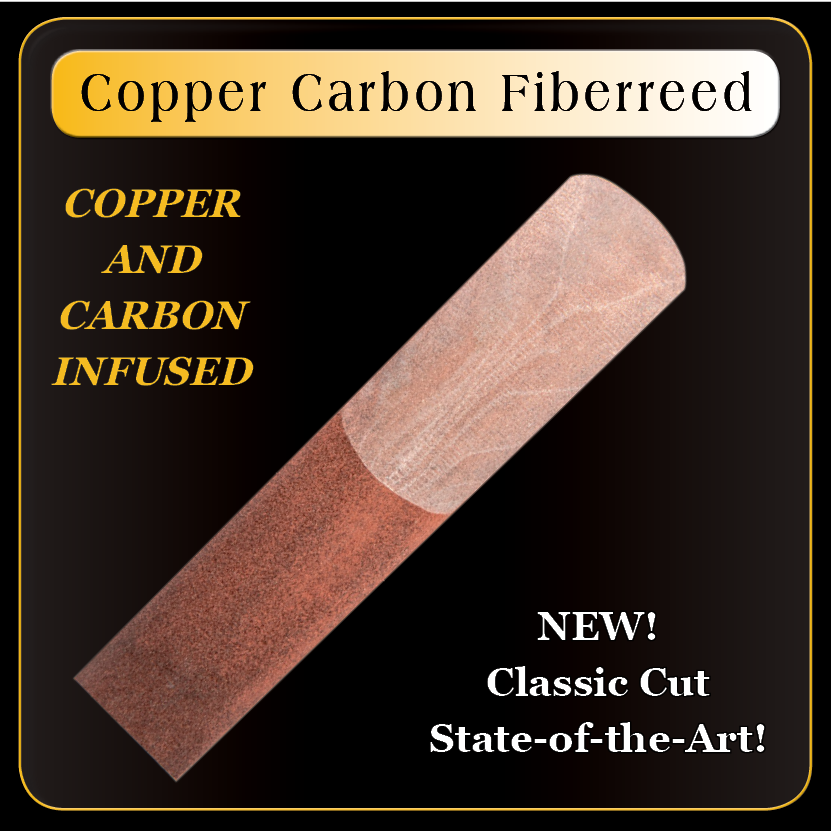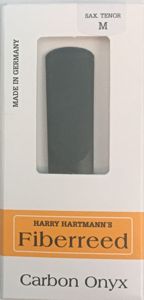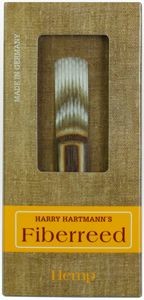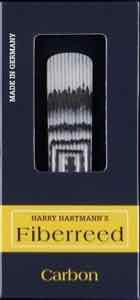
Tom Wanne Explains the Principles Behind Fiberreed
Harry Hartman started over two decades ago trying to mimic a cane reed. The two most important things he wanted to do was mimic the long strong fibers as well as the cellular structure that supports the fibers.
The “Natural” Fiberreed – Harry’s 1st Creation
![]() He developed a hollow fiber that goes the length and is also cross-woven across the reed. He does as many as 12 to 14 layers to create a mesh that produces the sound of a regular cane reed but is much stronger and plays very easily.
He developed a hollow fiber that goes the length and is also cross-woven across the reed. He does as many as 12 to 14 layers to create a mesh that produces the sound of a regular cane reed but is much stronger and plays very easily.
The “Carbon” Fiberreed – Harry’s 2nd Creation
![]() The difference between this carbon reed and the Natural reed is that there are carbon fibers woven into every 3-5 layers of the hollow fibers. You can see the pattern made by these dark layers of carbon fiber. This reed sounds a little bit brighter. The carbon adds some tonacity which adds overtones. It’s therefore a different sounding and playing reed than the Natural Fiberreed.
The difference between this carbon reed and the Natural reed is that there are carbon fibers woven into every 3-5 layers of the hollow fibers. You can see the pattern made by these dark layers of carbon fiber. This reed sounds a little bit brighter. The carbon adds some tonacity which adds overtones. It’s therefore a different sounding and playing reed than the Natural Fiberreed.
The “Hemp” Fiberreed – Harry’s 3rd Creation
![]() This reed was constructed on the same idea as the Carbon Fiberreed but instead of weaving in carbon fibers, he weaves in hemp fibers. These give it a darker and earthier sound which is a great contrast to the first two of his Fiberreeds. Another interesting fact is that 80% of this reed is actually made from natural and organic materials and it’s sound and feel is more comparable to a cane reed.
This reed was constructed on the same idea as the Carbon Fiberreed but instead of weaving in carbon fibers, he weaves in hemp fibers. These give it a darker and earthier sound which is a great contrast to the first two of his Fiberreeds. Another interesting fact is that 80% of this reed is actually made from natural and organic materials and it’s sound and feel is more comparable to a cane reed.
The “Carbon Onyx” Fiberreed – Harry’s 4th Creation
![]() Recently, Harry has developed a fiber carbon reed. This material which comes in fiber rods and fiber plates which are also used to make mouthpieces and other parts for instruments. We also developed our own reed from this same material.
Recently, Harry has developed a fiber carbon reed. This material which comes in fiber rods and fiber plates which are also used to make mouthpieces and other parts for instruments. We also developed our own reed from this same material.
There are carbon fibers in this material itself. It has proven to be easier to make than the other 3 fiberreed types and so will be priced lower than the others. It has an amazingly super tone and is easy to play.
The “Copper Carbon Classic” Fiberreed – Harry’s 5th Creation
![]() The Copper reed is the most recent creation. This material is similar to the Onyx but with added copper powder, and that is what makes the difference. It compares closest to the Onyx than the other models but there is a difference in the sound and also in the response.
The Copper reed is the most recent creation. This material is similar to the Onyx but with added copper powder, and that is what makes the difference. It compares closest to the Onyx than the other models but there is a difference in the sound and also in the response.
These 5 different types of Fiberreeds are all unique and we highly recommend you to try them out for yourself.

Harry Hartmann and Johnny Ferreira
“Maybe one day someone will make a synthetic reed that will allow me to stop relying so much on cane reeds.”
This is something I’ve said over the last decade. Some well-known synthetic brands were made known to me but I couldn’t make the switch.
At the NAMM show Harry Hartman introduced me to his full line of Fiberreeds. The biggest surprise was his new one called the Carbon Onyx Fiberreed. Blowing through the entire Fiberreed line I settled on two; the new Carbon Onyx and the Hemp.
Been very happy using these two reeds and still haven’t had the need to pull out the
old Vandorens yet. It’s been great not have to rely on boxes upon boxes of cane reeds!
I’m a proud endorser of these reeds and am happy to help get the word out.
Order Your Fiberreeds Here:
Carbon Onyx – Reed
$29.95 – $37.95Select options
Hemp – Reed
$37.95 – $41.95Select options
Carbon – Reed
$37.95 – $41.95Select options
Which Reed Strength is Right For You?
Fiberreed tells us that they follow the Rico cane reed brand very closely.
Here is the comparison chart:
- 1.5 = Soft
- 2 = Medium Soft
- 2.5 = Medium
- 3 = Medium Hard
- 3.5 = Hard
- 4 = Very Hard
- 4.5 = Extremely Hard
Unfortunately this chart was off for me. I play a #3 cane reed and found the medium Fiberreed was perfect for me. If I followed the above chart I’d pick the medium hard which would be a little too hard for me.
Solutions?
- Order what you think is your pefect strength and hope that it is
- Order 2 strengths to cover yourself just in case
- Get some fine grit sand paper and work on it a bit
There is some very helpful information on how to adjust a reed that is either too hard or too soft on the fiberreed site here: https://fiberreed.de/en/working-on-fiberreeds








